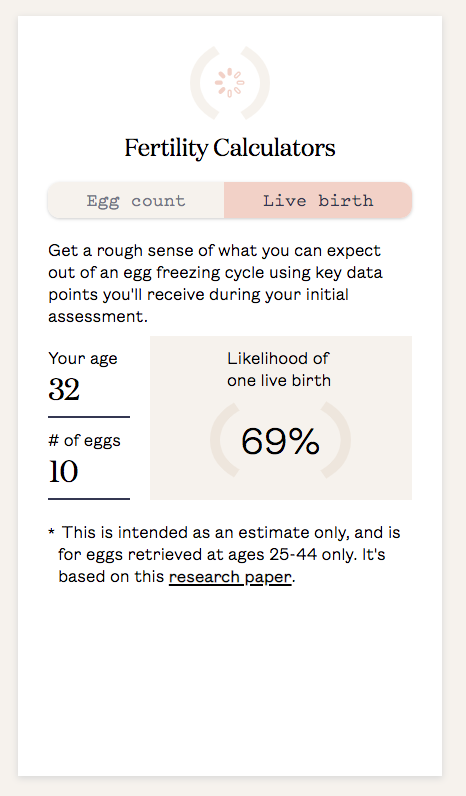If you knew you had an above average chance of getting Alzheimer’s or Melanoma, would you want to know? I was discussing my genetics results with some friends and their reactions fell into 2 camps:
- Knowledge is power
- Ignorance is bliss
When people walk by our fertility events, some initially respond with “Ah! I don’t want to know.” This partly stems from a fear that fertility is binary (you’re either fertile or you’re not), but also a fear of not knowing what you’d do about your results. To the above example, if you understood what steps you could take to mitigate your Alzheimer’s or Melanoma risk, this knowledge might actually empower you. Getting context around the data and your options are the critical pieces to owning your future. It’s similar with fertility.
Let’s start with a few facts you may have heard before:
(1) People are having children at an older age: For the first time ever, the birth rate was higher in 2016 for women in their 30s than for women in their 20s. (CDC: US Births)
(2) It gets harder when you are older: 1/3 of couples where the woman is 35+ have trouble conceiving, and 1/5 of their pregnancies result in miscarriage. For women over 42, over half result in miscarriage. (CDC: Infertility & NIH: Fetal Loss)
(3) Women wish they knew this sooner: a 2016 national survey showed that 52% of women over 35 said they would have made different life choices if they had known about the potential for infertility at a younger age. (CNBC: Survey)
This is not news to the medical community, so why are so many women still left in the dark?
Because the doctor’s visit of today was not set up for proactive or patient-driven decision-making.
Data is either withheld from patients, dumped on them without context, or outright misleading. Take success rates for example: fertility clinics are required to report their success rates, but they are free to turn away low-prognosis patients to keep these rates artificially high. What you really need to know is their success treating patients who are like you.
The stigma around fertility further contributes to misinformation and opacity. Women report feeling like they’ve failed if they seek fertility treatment, or that having a baby naturally is the only “right” way. Many do not share their experiences even with close friends, who may also be struggling with fertility, leaving each one to figure out the answers they’re looking for on their own.
This is where the power of brand comes in. There’s a cynicism about branding and marketing that equates it to insidious manipulation, but I offer an alternative perspective:
A good brand makes people talk where there’s not enough talk.
It can create community and build bridges across previously disconnected islands. Fertility questions can feel isolating, and the biggest risk factor is waiting too long to start asking them. If 1/3 of women over age 35 struggle to conceive, that means you have a 2/3 likelihood of not struggling. But how much do you care about not being the 1/3? This is the sort of thing that great brands should be used for.
For all the critics out there, if you’re worried that cute colors and a glass of champagne at an info session make women unable to think clearly about our health, I’d ask you to please give us some credit. More information is what truly equips us to make our best decisions, and we’ve been waiting a long time for an accessible setting to get the information we need. No one makes this decision on the spot.
At Kindbody’s regular “Egg Freezing 101” sessions, we’ve seen people come in timid and maybe a little bit scared. But then they learn the facts. They get familiar with them. They ask questions in a setting that encourages it. And then they leave less scared. When you understand scary things, and you understand what you can do about them, those things become less scary. Because the scariest thing is not knowing.
That’s why we believe in giving you the data you need to make your own best decision.

We believe providers must be trained to have open and empathetic conversations with you, and we provide the latest research in the form of easy-to-use calculators to help you understand what success would look like for you in an egg retrieval. We’re also collecting research so we can better personalize this through time.
No one should tell you whether you should or shouldn’t freeze your eggs.
That’s an inherently personal decision. But you should be thinking about this early, assessing the risks, and making a plan just like you would anything else that’s important in your life. We’ll show you the data. We’ll help you figure out what that means for your plan. That doesn’t sound scary to me.